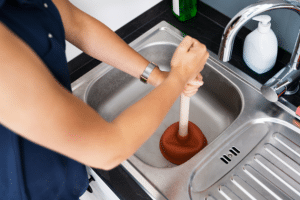click here to learn more about keeping your drains clean and free of blockages. A blocked drain can cause problems in the home, from an unpleasant smell to a complete disruption in the plumbing system. The cost of having an expert clear the blocked drain can be considerable, so it’s best to take action as soon as possible to try and avoid the drain becoming blocked.
What Causes Blocked Drains?
The most common causes of a blocked drain are items such as food scraps, hair, or soap suds that get stuck in the pipes. When these items build up over time, they form a clog and stop water or waste from flowing through the drain properly. It’s also possible that tree roots can grow into drainage pipes and block them. In some cases, age and weather conditions may cause cracking or misalignment in the pipes that can lead to a blockage too.
Signs of a Blocked Drain
When a drain starts to become blocked, there are a few warning signs that homeowners should look out for. These include: gurgling noises when flushing the toilet or running the tap; slow drainage when using sinks, toilets or bathtubs; odours coming from the drains; water backing up from other fixtures; and any pooling water in areas around the drain. If you spot any of these symptoms, it could indicate that your drain is blocked and needs to be cleared.

Preventing Blocked Drains
A blocked drain is usually the result of a build-up of material over time. The simplest way to prevent this is to be careful about what goes down the drain. Avoid putting food scraps, grease, fat, oil, coffee grounds, hair or sanitary products like cotton buds down the sink or toilet. Over time, these materials can build up and result in a blockage.
DIY Methods to Unblock Drains
If the problem is minor, then methods such as plunging or snaking can sometimes unblock the drain without having to hire a professional. A plunger is usually effective if there’s a minor blockage preventing water from draining. A drain snake is a long rod that can be inserted into the pipe to break up the blockage and let the water flow freely again. However, it’s important to note that these methods may not work for large clogs or if the blockage is located further down the line.
Professional Solutions for Blocked Drains
For major blockages, it’s best to call an experienced plumber who has the knowledge and tools to assess the situation and carry out the necessary repairs. They will be able to diagnose the issues by carrying out CCTV surveys and drainage tests, and can then advise on the best solution for unblocking the drain. This may involve clearing the existing blockage or replacing parts of the pipe in order to restore the drainage system.
Conclusion
It’s important to be aware of the signs of a blocked drain, and take steps to prevent blockages from occurring. If a blockage does occur, DIY methods such as plunging and snaking have a good chance of success. However, in more serious cases, it’s best to seek the help of a professional to identify and fix the issue safely and effectively.
